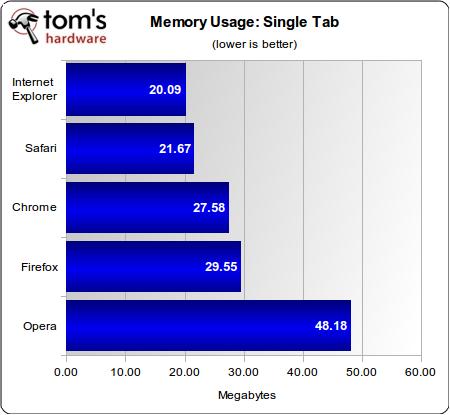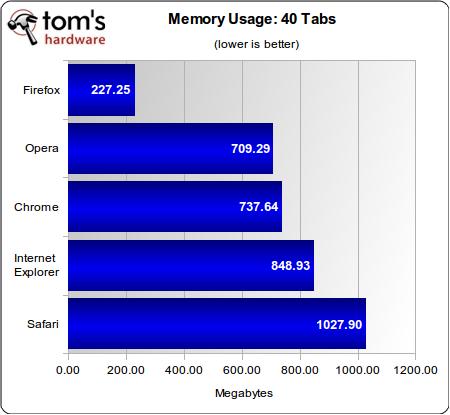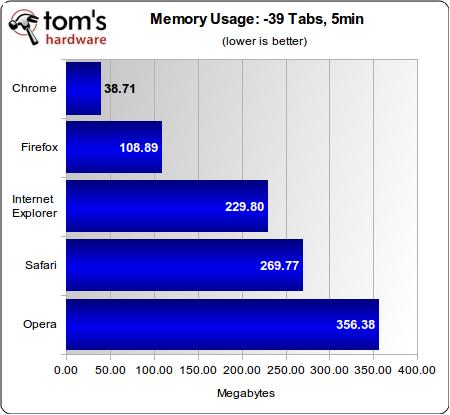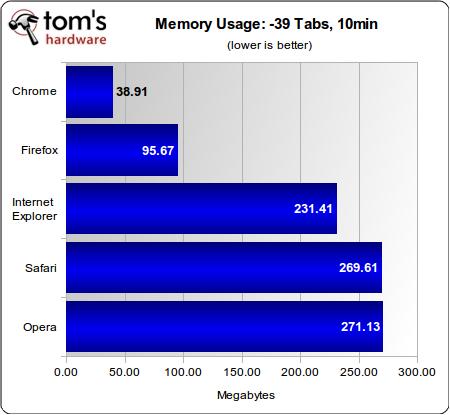Web Browser Grand Prix 2: The Top 5 Tested And Ranked
Benchmark Results: Memory Usage And Management
We modified our memory tests in accordance with some of the comments from the first article. Instead of just looking at how much memory each browser used, we also focused on how well that memory was managed. In the previous article, we tested each browser with ten, five, and a single tab open in a single browser window. This time, we took readings for a single tab after displaying google.com for five minutes. We then opened 39 more tabs, using sites that round out the Quantcast Top 40, ensuring that each site had fully loaded. After five minutes, a screen shot of Windows Task Manager was taken to record memory usage. We then closed all the tabs except the original containing google.com. We again waited five minutes before recording the numbers. Finally, we let the browser rest for an additional five minutes to see if the memory usage had dropped any further.
We performed this sequence of testing three times per browser. As stated on the previous page, we used live Web sites for this test. Too many of the top 40 sites are content-driven pages with scrolling headlines. Saving them to the hard drive would have lost content, and therefore provided a lower memory reading than real-world usage.
Single Tab
IE8 uses the least amount of memory in a single tab. Safari follows closely, with Chrome and Firefox in third and fourth (respectively). Opera uses the most memory in a single tab, more than twice as much as Microsoft's browser.
40 Tabs
Unfortunately, Apple Safari would not open 40 tabs at once. After nearly two hours, Safari only managed to fully open eight tabs of the forty-tab load. While the browser is capable of doing this, we found that the app maxes out our test system's CPU. A recreation of the benchmark was done on a top-of-the-line Core i7 rig, and though Safari took a noticeable time to completely load all of the tabs, it did finish. We ended up having to open each of the forty tabs one at a time for this benchmark to work.
Under the heavy load of 40 tabs, Firefox is the king of intelligent memory use. Mozilla's browser only monopolizes 230 megabytes with all forty Web pages fully loaded. Firefox demolishes second-place finisher Opera, which uses almost 710 megabytes. Opera is followed closely by Chrome, which uses just under 740 megabytes and Internet Explorer, which consumes nearly 850 MB. Apple's Safari uses the most amount of memory at just over one gigabyte.
Get Tom's Hardware's best news and in-depth reviews, straight to your inbox.
Side Note: Proper Page Loads
During the 40-tab test, we noticed how each of the browsers performed when completely loading and properly rendering Web pages. Chrome had trouble opening all 40 tabs correctly. A handful of the last few tabs did not load at all. And about half of those that loaded needed refreshing for missing or broken elements. Firefox, IE, and Opera did not have nearly as many broken pages, just a few here and there between the three iterations. Obviously, we had a heck of a time with Safari.
-39 Tabs
After closing all 39 additional tabs, leaving only Google open in a single tab, Google's Chrome returns nearly all of the previously-used system memory. Chrome only holds onto ten megabytes of excess RAM from the 39 closed tabs. This memory management is nothing short of exceptional. No other Web browser returns this amount of system memory after having so many tabs open. Even Firefox, which uses the least memory with a full load of tabs by far, returns less memory than Chrome (both in amount and in percentage). Firefox uses the second least amount of memory after closing 39 tabs, but only really returns half, holding onto 80 MB more than it had before the additional tabs were opened. Internet Explorer manages to surprise yet again, giving back three quarters of the 40-tab total. Safari also gives back three quarters of its 40-tab memory total, but that still puts it at 270 MB. Opera performs the worst in this arena, keeping over 350 megabytes after closing 39 of the forty tabs. Not only is this the largest amount of memory that a browser holds onto, but it is half of Opera's 40-tab total.
-39 Tabs: Five More Minutes
After an additional five minutes, Firefox gives back a noticeable amount of system memory (ten megabytes). Opera, on the other hand, gives back a more significant amount of RAM (90 MB). But the Norwegian Web browser still occupies last place. The other browsers showed no significant changes, and the placing remains the same.
Current page: Benchmark Results: Memory Usage And Management
Prev Page Benchmark Results: Java And Silverlight Next Page Benchmark Results: Standards Testing-
The Lady Slayer July 7th - Firefox 4 beta released.Reply
Tom's impending road test STILL BEHIND THE TIMES -
But you know what, apple said they have the world's fastest browser. I think we should just pack up and call it a day. The spoken word of god is indisputable...Reply
-
Tamz_msc I'm very happy to see my beloved Firefox's performance.Whatever people say about Opera and Chrome, Firefox is the best IMO.And Apple is proved to be a liar from this article.Reply -
mx2138 I've been using Firefox for about to two years now. I can't get enough of adblock plus. One of my favorite plug-ins.Reply -
wittermark lmao @ FFfanboys other review sites posted FF4 numbers, its performance is pathetic to say the least.Reply



